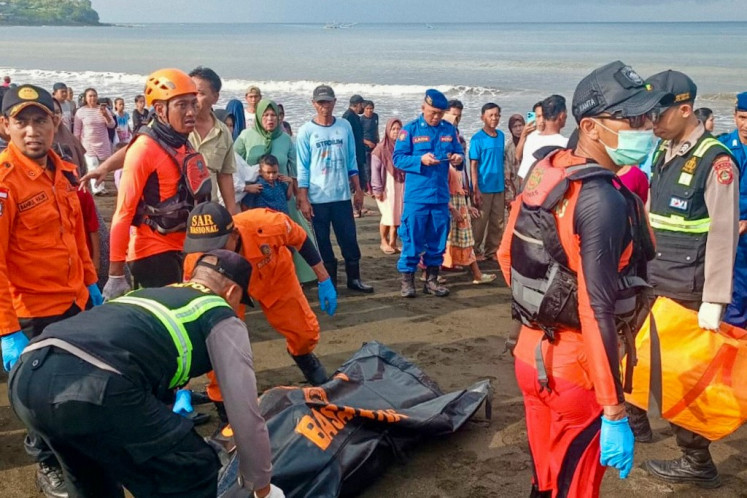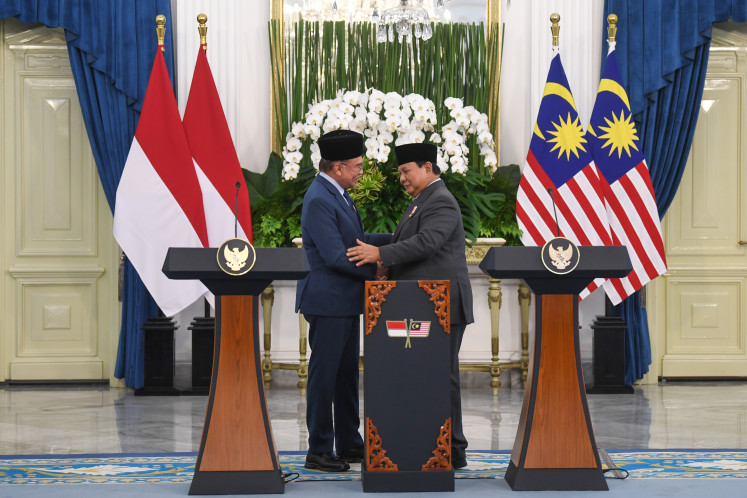Popular Reads
Top Results
Can't find what you're looking for?
View all search resultsPopular Reads
Top Results
Can't find what you're looking for?
View all search resultsRefugees heal trauma through writing, teaching
Nowhere to go: Rohingya refugees from Myanmar wait in line to have their babies vaccinated on Jl
Change text size
Gift Premium Articles
to Anyone

N
owhere to go: Rohingya refugees from Myanmar wait in line to have their babies vaccinated on Jl. Jamin Ginting in Medan, North Sumatra, not far from where they stay in the city. (JP/Apriadi Gunawan)
The refugee issue has often been politicized on both sides of the spectrum, so much so that the human aspects — including the trauma refugees seek to recover from — is often overlooked.
One of them is 30-year-old Abdul Samad Haidari, who managed to get out of Afghanistan and ended up in Indonesia in 2014.
Abdul is just one of some 14,000 stateless refugees and asylum seekers currently residing in Indonesia, according to data from the United Nations High Commissioner on Refugees in Indonesia (UNHCR Indonesia).
About 55 percent of these refugees in Indonesia are from Afghanistan, which leads us back to Abdul: A member of the persecuted Hazara ethnic group, he has witnessed people around him, including some family members, being killed in the most brutal ways possible.
Furthermore, he has probably seen more bodies — many of them chopped or torn into pieces in various terrorist attacks carried out by extremists — than a mortician or a forensic expert.
In his childhood, he fled from his country to several neighboring areas, only to be deported, before growing up in Pakistan, where his people are also persecuted.
At the age of about 18, he returned to Afghanistan after the Taliban rule had collapsed. Soon afterward, he joined the local English-language newspaper Daily Outlook Afghanistan, writing and editing stories there (you can still find his articles on the newspaper’s website by typing his name along with that of the newspaper in Google’s search box).
The collapse of the Taliban regime was soon followed by the emergence of multiple extremist groups; he and his colleagues started receiving numerous death threats [against them and their family members] by email and phone. One by one, his colleagues were physically assaulted, some disappeared without any trace.
When the lives of his remaining family members were also under threat for his journalistic work, they fled the country in 2013, but circumstances drove them apart. He has requested that his family’s current location not be disclosed for safety reasons.
In Jakarta, he has joined some writing communities, meeting many new friends that way. And yet, the brutality he has witnessed since childhood has left very deep imprints on his brain.
“Sometimes I swing between losing my appetite and eating too much; I easily become startled by the loud sound of a motorcycle exhaust as it speeds down the road, or by the sound of sirens, or if I see people walking fast toward me,” Abdul said. Upon visiting a psychiatrist, he has been diagnosed with post-traumatic stress disorder (PTSD).
According to Jane Pietra, a psychologist with the Pulih Foundation, an organization dedicated to trauma healing, PTSD is the body’s normal response to prolonged exposure to threats against one’s life as well as a lack of basic security, which refugees often experience in their war-torn countries.
Having to relocate to foreign countries and being separated from their families adds to the trauma refugees suffer, she adds. All these life experiences cause a lack of trust in other people, hypervigilance and intense anxiety as the hallmarks of PTSD, she continues.
Some PTSD symptoms can be very subtle, reflecting in compulsive nonverbal behavior, such as rubbing one’s hands against the pleat of one’s clothes or clicking the tongue repeatedly, which Abdul also exhibited throughout our interview session.
Solutions
Problems, thankfully, always come with solutions. According to Jane, PTSD can be healed: PTSD is marked by the severing of one’s connection with the community, and in order to heal it, one has to mend refugees’ social fabric in whatever place they happen to be through communal activities.
Abdul finds poetry helpful, as well as literary activities together with some Indonesian friends and fellow refugees. “You just put your thoughts on paper using your pen, releasing your burden that way. My friends here are the reason I’m still alive,” he said. He was also invited to the 2019 Ubud Writers and Readers Festival in Bali.
Meanwhile, a 25-year-old male Eritrean refugee who has fled his home country’s military dictatorship has found a new sense of purpose in teaching English at a local community school.
The refugee, who wishes not to be named, said he had been drowned in self-pity and lost some sense of hope in the future, having witnessed how brutal human beings can be. But he eventually found joy again among his students.
“It has totally changed my life. I like the positivity; the children have lots of energy, they are talking to you, hugging you or giving you something. Teaching is the best cure,” he said.
It is true what American Buddhist Tara Brach once said: We are wounded mostly by human beings and we need human beings to heal.









